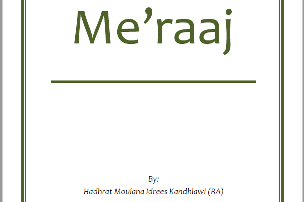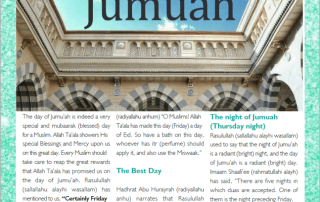Surahs (2)
Grade Zero
Surah Faatiha
Surah Ikhlaas
Surah Naas
Surah Kausar
Extra: Last 3 aayaat of Surah Saafaat (Pg 628)
Grade One
Surah Asar
Surah Falaq
Surah Lahab
Surah Nasar
Extra: Last 2 aayaat of Surah Bani Israeel (Pg 408)
Grade Two
Surah Kafiroon
Surah Ma’oon
Surah Quraysh
Surah Feel
Extra: Ayat no.26 & 27 of Surah Aali Imraan (Page 72-73)
Grade Three
Surah Humaza
Surah Takaasur
Surah Al-Qaari’ah
Surah Aa’diyaat
Extra: Aayatul Kursi
Grade Four
Surah Zilzaal
Surah Qadar
Surah Teen
Surah Inshiraah
Extra: Last 3 aayaat of Surah Hashar (Page 765)
Grade Five
Surah Duha
Surah Yaseen Aayah 1-12
Surah Yaseen Aayah 13 –21
Surah Yaseen Aayah 22 –32
Extra: Last Ruku of Surah Baqarah (Page 67)
Grade Six
Surah Yaseen Aayah 33-46
Surah Yaseen Page 47-61
Surah Yaseen Aayah 62 –74
Surah Yaseen Aayah 75-83
Extra 1: Surah Bayyinah (Pg. 840)
Extra 2: Surah ‘Alaq (Pg 839)
Grade Seven
Surah Mulk Ruku one
Surah Mulk Ruku two
Extra: Surah Alif Laam Meem Sajdah (Pg. 577)
The Respected Mother of Hadhrat Mufti Ebrahim Salejee Saahib (daamat barakaatuhu)
On Sunday 29 December 2019, 02 Jumaadus Saani 1441, the respected mother of our beloved Ustaaz, Hadhrat Mufti Ebrahim Salejee Saahib (daamat barakaatuhu) passed away in the early hours of the morning whilst she was asleep. May Allah Ta’ala make her maghfirat and grant her the highest stages in Jannatul Firdaus. Aameen.
She was indeed a very pious, righteous, Allah-fearing woman who was an inspiration to one and all.
It was her good fortune that she was born in Makkah Mukarramah whilst her parents were on the journey of Haj. She was thus given the name Makkiyah. As a new born child, her parents would keep her in the Hateem whilst they made tawaaf of the Ka’bah Shareef. She was indeed fortunate to have earned the blessings of the Haramain Shareefain in her infancy.
Hereunder are a few incidents from her noble life which hopefully will serve as an inspiration for us all, Insha Allah.
Ta’leem at home:
She was very particular about the daily ta’leem at home. After Asar Salaah she would gather all the members of the home and make sure ta’leem was read from the books Fazaail-e-Aamaal, Fazaail-e-Sadaqaat as well as the Behishti Zewar of Hadhrat Moulana Ashraf Ali Thanwi (rahmatullahi alayh). She would prefer the ta’leem to be done in Urdu. Before the ta’leem would commence, she would ask someone to first recite the 40 Durood and Salaam and after the ta’leem was over everyone must engage in zikr for some time and then a collective dua was made. On one occasion she mentioned to Hadhrat Mufti Saahib (daamat barakaatuhu), “On the day ta’leem is not done in the home, I feel as if something is wrong. I sense some void on that day.” It was her honourable habit to encourage one and all to diligently have ta’leem at home every day. She would make a special point of reading the section on “Upbringing of children” from the Behishti Zewar. If anyone in the family was getting married she would make them read this section over and over again.
Tahajjud:
Till the end of her life she was very punctual with the performance of Tahajjud Salaah. Even-though she was quite old and weak, she would wake up in the early hours of the morning and engage in salaah, dua and zikr. She had an excellent habit of daily making special dua for all her children and grandchildren. It was her practice every day to perform two rakaats of salaah and then make special dua for her son, Hadhrat Mufti Saahib (daamat barakaatuhu).
Salaah:
She was very particular about performing salaah in the “Awwal Waqt” (i.e. the moment the time for salaah sets in). She would not like that salaah be delayed and would encourage others to also read their salaah early. Qur-aan Shareef Tilaawat: She was an ardent lover of the Qur-aan Shareef and would recite the Qur-aan-e-Kareem daily in a large print Qur-aan. Her Qur-aan Shareef always remained covered and kept in a ghilaaf (cloth) with great adab and respect.
Taking care of the weak, poor, old and sick:
One of her many outstanding qualities were that she always showed special care and love for those who were weak or slow. Children who had a natural weakness or disability enjoyed her special favour and kindness. She would go out of her way to care for them and make them happy saying that Allah Ta’ala’s help comes to us because of the weak amongst us. This is actually the words of a Hadith of Rasulullah Sallallahu Alayhi wasallam;
انما تنصرون و ترزقون بضعفائكم
“Indeed you are provided with help and rizq because of the weak ones amongst you.”
A young girl from Mpumalanga, who is unable to walk from birth, says that she would love to come and meet Hadhrat Mufti Saahib’s mother because of the special care and love she showed to her. “Whenever I came to meet her, she always made me feel very special,” says the young girl. This is in-fact the feelings experienced by most people who visited her.
She would prefer to do the weekly ladies ta’leem in poorer areas like Malugazi, Isipingo Rail and Lotus Park. She attracted many poor people to Islam in this way. Many reverts to Islam who had no support from their families would say that she was like a mother to them. Towards the end of her life she wouldn’t go out anywhere due to her ill health, but if she heard of the Janaazah of a poor person, she would take the trouble and effort and especially go to attend the funeral or at least visit the family of the deceased. She loved the poor and would always try to be with them.
She would make a point of supporting the people that go house to house selling food items to earn a living. Even if there was no need to purchase anything, she would still make a point of buying it just to support them in some way. On hot days she would provide cold water for these people, as well as the beggars that came to the house.
She would be very particular about treating her domestic workers with care and affection. If any of them gave birth, she would send some clothing to them as a gift showing her special care and affection for them. A domestic worker commented that whenever she went to Hadhrat Mufti Saahib’s mother’s hoاme, she always asked her how she was keeping. This would make her feel very special and comfortable.
Many years ago a lady in Isipingo Beach was widowed. She hailed from India and had no children. Most of her family lived in India. After her husband passed away, she had nowhere to go. Hadhrat Mufti Saahib’s mother happily took her into her home and looked after her like a widowed sister right until she passed away, whereas she was in no way related to her. She would happily entertain this widows visitors without any fuss or complaint. Today, how many of us are able to bring an old person into our home who has no one to take care of them? Our hearts have become so small and constricted that we have no place for even our close family members.
Punctuality on mamoolaat:
Another outstanding quality was her punctuality on her daily mamoolaat. She was bay’at to Hadhrat Moulana Badr-e-Aalam Saahib Madani (rahmatullahi alayh) of Madinah Munawwarah. He had prescribed the daily reading of the Hizbul Azam, etc. Till the last days of her life she was very punctual on all her mamoolaat. At times whilst reciting the Hizbul Azam and 40 Durood and Salaam, she would doze off a little. Her sons would tell her at times to have a rest and read her wazeefahs later on, but she would refuse saying: “If you don’t complete your ma’moolaat on its prescribed time, you will not do it later on.” She was always seen with a tasbeeh in her hand and her tongue would always be busy in the zikr of Allah Ta’ala. By looking at her one would easily understand the meaning of the Hadith
Let your tongue always be moist with the zikr of Allah
Support to Madrasah Taleemuddeen:
When Hadhrat Mufti Saahib (daamat barakaatuhu) completed his studies in Darul Uloom Deoband and had returned home, he intended to start off a Madraasah for Hifz and Aalim students. Some people advised him that he should work half day and teach half day and in this way he would be able to earn an income and also teach Deen. However, his respected mother advised him to spend his entire time for Deen and that they (his parents) will support him. In this way Hadhrat Mufti Saahib (daamat barakaatuhu) was able to dedicate all his time and effort to the Madrasah. Today, the beautiful Darul Uloom that we see in Isipingo Beach, is through the selfless efforts of Hadhrat Mufti Saahib (daamat barakaatuhu) as well as the support and encouragement of his respected parents. May Allah Ta’ala reward them abundantly and fill their qabars with noor. In the early days of the Madrasah there was no kitchen where food was prepared for the students. Alhamdulillah Hadhrat Mufti Saahib’s mother would prepare some meals herself and send it for the Madrasah students. She would have a special place in her heart especially for the foreign students and would at times invite them to her home for meals. She would take care to prepare the meals according to their taste and culture. Often she would order fish, pay for it with her own money and prepare it for the Thailand and Philippine students. She would say, “They have come from so far to learn Deen, we should at least try and make them comfortable and keep them happy.”
Support to the work of Da’wat and Tableegh:
In the initial days of the Tabligh Jamaat, when Hadhrat Haji Bhai Padia Saahib (RA) was trying in earnestness to establish the Jamaat work in South Africa, Hadhrat Mufti Saahib’s mother was in the fore front of the mastooraat (ladies) effort. She would happily and willingly prepare and feed jamaats and Ulama in her home. She would say to the menfolk, “Just let me know in advance how many people are coming for meals and insha Allah I will have the meals ready for them.” This was her habit also in Makkah Mukarramah and Madinah Munawwarah, to feed the Ulama and the Jamaats that had come for Haj or Umrah. No amount of people were too many to feed.
Connection with the Awliyaa:
From a long time, the Salejee family had a close ta’lluq and connection with many of the Awliyaa and Buzrugaan-e-Deen. Many of our Akaabir knew the family personally and many of them would stay over at her home. Amongst the many Awliyaa and Akaabir that came and stayed over at her home or partook of meals were Hadhrat Shaikhul Hadeeth, Hadhrat Moulana Muhammad Zakariyya (RA), Hadhrat Moulana Saeed Khan Saahib (RA), Hadhrat Moulana Ina’amul Hasan Saahib (RA), Hadhrat Moulana Muhammad Umar Paalanpuri (RA), Hadhrat Moulana Moosa Saamrodhi (RA), Hadhrat Mufti Mahmood Hasan Gangohi (RA), Hadhrat Moulana Maseehullah Khan Saahib (RA), Hadhrat Moulana As’ad Madani (RA), Hadhrat Moulana Siddeeq Ahmad Baandwi Saahib (RA), Hadhrat Moulana Abraarul Haq Saahib (RA), Hadhrat Moulana Hakeem Akhtar Saahib (RA) and many many other great Ulama and Awliyaa. Hadhrat Moulana Faqeer Muhammad Saahib (RA) who was the khalifah of Hadhrat Moulana Thanwi (RA), and also a resident of Makkah Mukarramah, was also very close to the family. He would in fact make special dua for Hadhrat Mufti Saahib’s mother in particular. In this way, the family enjoyed a strong connection with many Awliyaa-e-Kiraam. Even the Imaams of the Haram Shareef in Makkah Mukarramah and Madinah Munawwarah visited her home and partook of meals at her dastarkhaan by the grace of Allah Ta’ala.
Dressing:
She was very particular about how girls and females dressed. She abhorred tight fitting, body hugging clothing and insisted that all women dress modestly with long flowing garments, as hayaa (modesty) is the hallmark of a believer. If she saw anyone in the family wearing incorrect clothing like short sleeves or short dresses, she would immediately reprimand them and ask them to go and change their clothing. At 9:00 a.m. on Sunday morning, Hadhrat Mufti Saahib (daamat barakaatuhu) led her Janaazah Salaah at Madrasah Ta’leemuddeen. She has left behind many children, grandchildren and great-grandchildren, many of whom are Huffaaz, Ulama and Awliyaa. Two of her sons, Hadhrat Mufti Ebrahim Salejee Saahib (daamat barakaatuhu) and Moulana Husain Salejee Saahib (daamat barakaatuhu), are senior Ustaads serving Madrasah Taleemuddeen. May Allah Ta’ala fill her qabar with noor and grant her the highest stages in Jannatul Firdaus. Aameen.
The Day of Jumuah
The Day of Jumuah
Jamaadul Aakhir 1441 – February 2020



